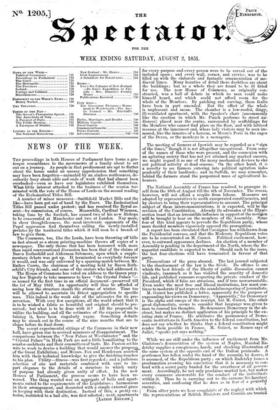NEWS OF THE WEEK.
TILE proceedings in both Houses of Parliament have borne a gro- tesque resemblance to the movements of a family about to set out on a journey. As people in that predicament are apt to flutter about the house under an uneasy apprehension that something
may have been forgotten—animated by an aimless restlessness, de- sultorily busy about odds and ends of work that had almost been overlooked—even so have our legislators exhibited themselves. What little interest attached to the business of the session ter- minated with the vote of the House of Lords on the second reading of the Ecclesiastical Titles Bill.
A number of minor measures—Smithfield Market Bills and the like—have been got out of hand by the Peers. The Ecclesiastical .Titles Bill passed under. protest; and has received the Royal as- sent—by commission, of course. Meanwhile, Cardinal Wiseman, taking time by the forelock, has caused two of his new Bishops to be consecrated at Manchester and two at London. Nay more, in sheer thoughtlessness, the most inveterate opponents of the Papal aggression find thembelves calling the newly-installed prelates, by the territorial titles which it will soon be a breach of law to give them. The Commons, too, like the Lords, have been throwing off bills as fast almost as a steam printing-machine throws off copies of a newspaper. The only theme that has been honoured with more than rapid conversational discussion has been that of the claims of Bann Rothschild and Alderman Salomons, upon which a supple- mentary debate was got up. It terminated as everybody foresaw it would, and was only enlivened by a sparring-match between Mr. Raikes Currie, the chairman of a meeting held by Baron Roth- schild's City friends, and some of the orators who had addressed it. The House of Commons has voted an address to the Queen pray- ing her Majesty to take measures to have "the Crystal Palace "— so named for the first time in an official document—preserved till the 1st of May 1852. An opportunity will thus be afforded of teeing how the structure stands the storms of winter. Time too will be allowed to ascertain- its fittest appropriation to specific uses. This indeed is the weak side of the advocates for its pre- servation. With very few exceptions, all the world admit that it is to be -wished a fabric so beautiful and original should be pre- -served; but what is to be done with it ? All the proposals to utilize the building, and all the estimates of the expense of main- taining it, have been singularly vague. Something definite may be struck out in the course of the nine months that are to elapse before its final doom. The recent experimental sittings of the Commons in their new
hall, have given rise to revived murmurs of disappointment. The comparisons between the "New Palace at Westminster" and the "Crystal Palace "in Hyde Park are not a little humiliating to the senator-architects and their committees of taste. Mr. Paxton set his wits to work to devise a building that would answer the purpos.a_ of the Great Exhibition; and Messrs. Fox and Henderson assisted him with their technical knowledge to give the finishing-touches -to his plan. Utility—fitness—was first regarded ; and a judicious selection of site and materials combined with care to im- part elegance to the details of a structure to which unity of purpose had already given unity of effect. In the new Houses of Parliament, the process seems to have been re- versed. The thing wanted was an aggregate of halls and apart- ments suited to the requirements of the Legislature ; harmonious • in their arrangement, -and decorated with 'a _simple external grace in keeping with their destination. Instead of this, a pretty ex- I lerior, restricted to a bad site, Was first selected ; next, apartments ' [LATEST EDITION.]
for every purpose and every person were to be carved out of the included space ; and every wall, corner, and crevice, was to be filled up with the elaborate and fantastic ornamentation of me- diseval times. Many beauties of detail there doubtless are about the buildings ; but as a whole they are found to be ill fitted fez...use. The new House of Commons, as originally con- structed, was a hall of debate in which no man could make himself heard, and which could not afford room for the whole of the Members. By patching and carving, these faults have been in part amended. But the effect of the whole is unpleasant and mean. The chamber is a low-roofed, d' ill-ventilated apartment, with the Speaker's chair (uncommonly like the erection in which Mr. Punch performs to street au- diences) placed near the centre, surrounded by scaffoldings for the Members who cannot find place on the floor, and with latticed recesses at the innermost end, where lady visitors may be seen im- mured, like the inmates of a hareem, or Moore's Penis in the cages of the Deves, or the monkeys in a menagerie.


























